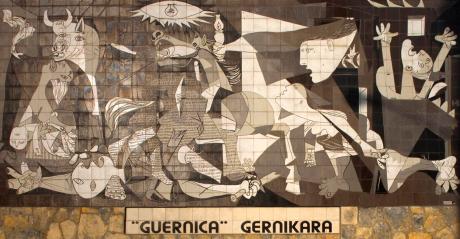At the beginning of Part I there’s a list of what we’ve accomplished during this century.
I’m going to remind you now some of the mistakes we’ve made.
Genocide, atomic bomb, global warming, widespread pollution… basically, we’ve turned the tables upon ourselves.
I had the first inkling of what’s going on when I started to compare what’s currently going on in Syria with the Spanish Civil War.
NB, even the name we use for this kind of conflict is an absolute aberration. War is, by definition, the opposite of civility. Why on Earth any of us might consider that war waged between co-nationals can be expected to be more ‘civil’ that the ‘regular brand’…
Spain and Syria have evolved in eerily similar manners. Multiple ethnic groups of multiple religious convictions have been forced by geography to coexist and to evolve together. Each of them had passed through very similar stages, albeit following different time-tables. The whole thing culminated with both of them passing, during the last century, through ‘revolutionary’ episodes. There are two small differences though.
Spain’s ‘revolution’ had taken place at the end of a turbulent period and had produced a dictatorship – Franco’s, while the Syrian one is the consequence of a dictatorship and has not yet yielded a clear result.
And why is any of this of any interest when analyzing the entire century? Except, maybe, that the two atrocious episodes have marked the start and the beginning of the said century?
Well, it’s how the rest of the world have chosen to react in each instance which I find extremely interesting.
First of all, let me remind you the broad picture in both cases.
Spain’s took place shortly after the end of WWI and immediately after the Great Depression. The most important ‘disruptive ferment’ was militant marxism and although not all of those fighting on the side of the revolutionaries adhered to this ideology the presence of the marxists had decisively shaped the reaction of the democratically elected governments of the world. They had chosen to basically stay out of it. Despite the fact that Franco was leading a rebellion and that the Republican Government had been dully elected to office.
At the beginning, France’s first socialist PM, Leon Blum, had assisted the Republicans but recanted shortly afterwards, “under pressure from Stanley Baldwin and Anthony Eden in Britain, and more right-wing members of his own cabinet”. Which, in a way, made some sense. Western Europe was frightened that communism might spread westwards and many of the Spanish Republicans were of communist persuasion. “Baldwin and Blum now called for all countries in Europe not to intervene in the Spanish Civil War. A Non-Intervention Agreement was drawn-up and was eventually signed by 27 countries including the Soviet Union, Germany and Italy. However, Adolf Hitler and Benito Mussolini openly ignored the agreement and sent a large amount of military aid, including troops, to General Francisco Franco and his Nationalist forces.” Stalin also ignored the agreement and send some help to the Republicans but got bored and by 1938 he practically forgot about the whole thing.
In the end, the conflict had been won by the side supported by those seeking revenge for being defeated during WWI – and for the harsh conditions imposed by the Treaty of Versailles.
That had been the ‘institutional’ reaction.
On the popular side, despite the ‘hang-over’ produced by the WWI and the Great Depression, some 60.000 volunteers from all over the world had joined the ‘fight for freedom’. The fact that they were organized by the Comintern didn’t help in the end, on the contrary, but the population at large looked at them with sympathy. Proven by the success enjoyed by the literature and art produced by some of the volunteers/sympathizers.


[…] Part II ended on the Western side of the Mediterranean sea, right before WWII. Which, by the way, was a consequence of the WWI victors making a terrible mistake. […]
LikeLike